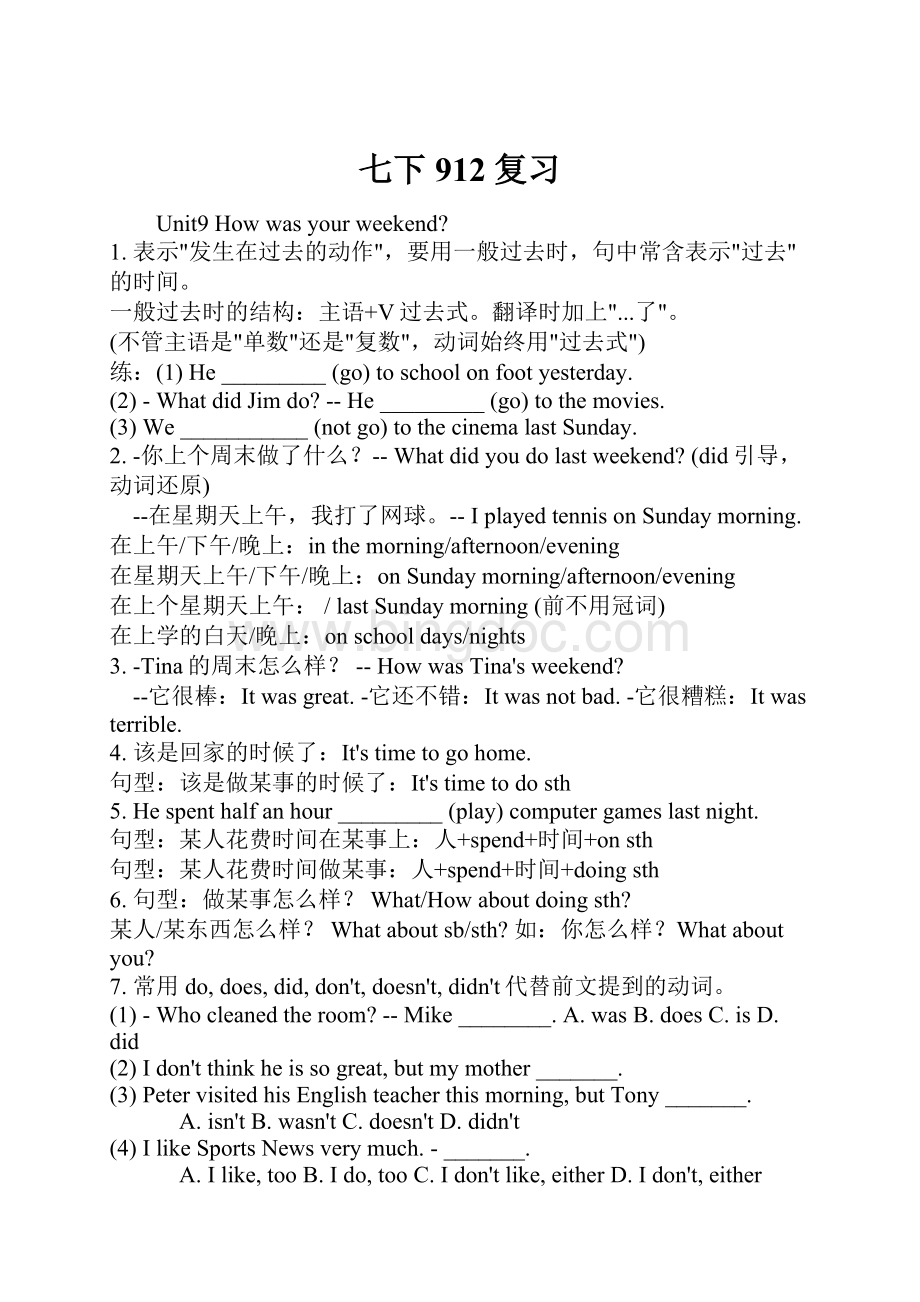七下912复习.docx
《七下912复习.docx》由会员分享,可在线阅读,更多相关《七下912复习.docx(7页珍藏版)》请在冰点文库上搜索。

七下912复习
Unit9Howwasyourweekend?
1.表示"发生在过去的动作",要用一般过去时,句中常含表示"过去"的时间。
一般过去时的结构:
主语+V过去式。
翻译时加上"...了"。
(不管主语是"单数"还是"复数",动词始终用"过去式")
练:
(1)He_________(go)toschoolonfootyesterday.
(2)-WhatdidJimdo?
--He_________(go)tothemovies.
(3)We___________(notgo)tothecinemalastSunday.
2.-你上个周末做了什么?
--Whatdidyoudolastweekend?
(did引导,动词还原)
--在星期天上午,我打了网球。
--IplayedtennisonSundaymorning.
在上午/下午/晚上:
inthemorning/afternoon/evening
在星期天上午/下午/晚上:
onSundaymorning/afternoon/evening
在上个星期天上午:
/lastSundaymorning(前不用冠词)
在上学的白天/晚上:
onschooldays/nights
3.-Tina的周末怎么样?
--HowwasTina'sweekend?
--它很棒:
Itwasgreat.-它还不错:
Itwasnotbad.-它很糟糕:
Itwasterrible.
4.该是回家的时候了:
It'stimetogohome.
句型:
该是做某事的时候了:
It'stimetodosth
5.Hespenthalfanhour_________(play)computergameslastnight.
句型:
某人花费时间在某事上:
人+spend+时间+onsth
句型:
某人花费时间做某事:
人+spend+时间+doingsth
6.句型:
做某事怎么样?
What/Howaboutdoingsth?
某人/某东西怎么样?
Whataboutsb/sth?
如:
你怎么样?
Whataboutyou?
7.常用do,does,did,don't,doesn't,didn't代替前文提到的动词。
(1)-Whocleanedtheroom?
--Mike________.A.wasB.doesC.isD.did
(2)Idon'tthinkheissogreat,butmymother_______.
(3)PetervisitedhisEnglishteacherthismorning,butTony_______.
A.isn'tB.wasn'tC.doesn'tD.didn't
(4)IlikeSportsNewsverymuch.-_______.
A.Ilike,tooB.Ido,tooC.Idon'tlike,eitherD.Idon't,either
(5)MyfatherlikesSportsNews,butmymother_______.
8.去爬山:
gotothemountains爬山:
climbthemountains
去购物:
goshopping
去看电影:
gotothemovies看电影:
seeamovie=watchamovie
去散步:
goforawalk散步:
takeawalk
去图书馆:
gotothelibrary去城市图书馆:
gotothecitylibrary
9.待在家里:
stayathome
10.为考试而学习:
studyforthetest=studyforexams
11.举行派对:
haveaparty举行晚会:
haveaneveningparty
12.阅读:
dosomereading
13.去海滩:
gotothebeach(beach变复数+es)
14.练习英语:
practiceEnglish
句型:
练习做某事:
practicedoingsth
15.过了一个繁忙的某末:
haveabusyweekend(此处的have翻译为"度过")
16.一本关于历史的书:
abookabouthistory(此处的about翻译为"关于",=on)
17.带某人去某地:
takesbtosp
18.乘车去某地:
gotospbycar(car前无其他单词,"乘"用by)
=gotospintheircar(car前有其他单词,"乘"用in)
19.
(1)last最后的;在最后一张照片里:
inthelastphoto
(2)last上一个;上个星期:
lastweek上个月:
lastmonth去年:
lastyear
20.
(1)spend度过;如:
Howdoyouspendyoursummerholidays?
(2)spend花费;如:
Hespenttwohourscleaninghisroom.
21.
(1)for对...来说;如:
对大多数的孩子来说:
formostkids
(2)for为,给;如:
为我烧晚饭:
cookdinnerforme
Unit10Wheredidyougoonvacation?
1.--你去了哪里度假?
--Wheredidyougoonvacation?
(go是实义动词,前用did引导)
--我去了夏令营。
--Iwenttosummercamp.
--你玩得开心吗?
--Didyouhaveagoodtime?
(have是实义动词,前用did引导)
--是的。
Yes,Idid.
度假:
onvacationforone'svacation如:
ShewenttoShanghaiforhervacation.
玩得开心:
haveagoodtime=havefun
2.我们很高兴在水里玩:
Wehadgreatfunplayinginthewater.
句型:
很高兴做某事:
have(great)fundoingsth
在水里:
inthewater(介词用in)
3.它有点无聊:
Itwaskindofboring.
有点:
kindof=alittle
4.我发现一个小男孩正在角落里哭:
Ifoundasmallboycryinginthecorner.
句型:
发现某人正在做某事:
findsbdoingsth
句型:
听见某人正在做某事:
hearsbdoingsth
在角落里:
inthecorner(介词用in)
在...的角落里:
atthecornerof...如:
Hestandsatthecorneroftheclassroom.
练:
Wefoundhersister__________(read)Englishinherroom.
5.他迷路了:
Hewaslost.
(1)lostadj.迷路的;前面常加be动词。
(2)lostv.丢失lose的过去式;如:
Helosthisway.
6.那让我感觉很高兴:
Thatmademefeelveryhappy.
句型:
让某人做某事:
makesbdosth=letsbdosth
感觉很高兴:
feelveryhappy
练:
Thefunnystorymakesus_________(laugh)alot.
Let's__________(讨论)thisquestionfirst.
7.我们决定走着回宾馆:
Wedecidedtowalkbacktothehotel.
句型:
决定做某事:
decidetodosth.
走着回宾馆:
walkbacktothehotel
练:
Hisfatherdecided__________(buy)anewcomputerforhim.
8.考与"一般过去时"配套使用的时间:
(1)-Wasyourfatheratwork_______?
--Yes,hewas.
A.lastweekB.everymonthC.thisyearD.nextMonday
(2)-Whendidyouseehim?
--_______.
A.NextMondayB.TwohoursC.InanhourD.Anhourago
9.去纽约市:
gotoNewYorkCity(go的过去式went)
去夏令营:
gotosummercamp
去博物馆:
gotothemuseum参观博物馆:
visitthemuseum
去中心公园:
gotoCentralPark
10.为考试而学习:
studyforexams(study的过去式studied)
11.什么也没有做:
donothing(nothing指"什么也没有")
练:
--Doyouhaveanythingelsetosayaboutthetrip?
--No,_______.
A.anythingB.nothingC.somethingD.everything
12.整天:
allday整夜:
allnight整日整夜:
alldayandallnight
13.
(1)lookfor寻找(强调"找"这个过程);
(2)find找到(强调"找到"这个结果);
如:
HelookedforhisEnglishbook,buthedidn'tfindit.
14.
(1)friendly友好的;
(2)unfriendly不友好的;=notfriendly
Unit11Whatdoyouthinkofgameshows?
1.--你认为某人/某东西怎么样?
--Whatdoyouthinkofsb/sth?
(后是thinkof,前用What)
=Howdoyoulikesb/sth?
(后是like,前用How)
--①我认为某人是...的。
--(Ithink)sbis/are+用于评价人的"内在品质"的形容词。
我认为某东西是...的。
--(Ithink)sthis/are+形容词(如interesting,relaxing,exciting)。
--②我不能忍受他。
--Ican'tstandhim.
我不介意她。
--Idon'tmindher.
我爱(喜欢)他们。
--Ilove(like)them.
我不爱(喜欢)它。
--Idon'tlove(like)it.
与第6单元比较(对外表提问):
--WhatdoesTinalooklike?
--Sheis_______.
A.shyB.cleverC.mediumheightD.heavy
练:
(1)--_______doyoulikesportsshows?
--Ilikethemverymuch.
(2)--_______doesYaoMinglooklike?
--Heistallandstrong.
2.你能帮我吗?
Canyouhelpme?
语法:
动词后的"人称代词"用宾格。
练:
Hisbrotherboughtsomenewbooks,helikes_______verymuch.
A.itB.themC.theyD.me
3.用于评价人的"外表"的形容词主要有(见Unit7):
(1)tall,beofmediumheight,short;
(2)heavy/fat,beofmediumbuild,thin;
(3)beautiful,ugly,cute,lovely,cool,scary;
用于评价人的"内在品质"的形容词主要有:
smart,clever,friendly,shy,quiet,lazy,popular等。
4.阿伦是一个8岁的男孩。
--Alanisaneight-year-oldboy.
比较:
阿伦8岁。
--Alaniseightyearsold.
点拨:
(1)当"几岁"后有名词如"boy/girl"时,"几岁"用"连字符"相连,且year不加s;
(2)当"几岁"后无名词时,"几岁"不用"连字符"相连,岁数大于1,year加s;
5.欢迎来到9点钟的周末谈话节目:
Welcometo9o'clockWeekendtalkshow.
欢迎来某地:
welcometosp.
6.烧饭是妈妈们的事:
Cookingisformoms.
围巾是给妈妈们的:
Thescarfisformoms.
7.谢谢你加入我们:
Thankyouforjoiningus.
句型:
感谢做某事:
Thanksfordoingsth.
8.我给每个学生看六样东西然后问他们关于每一个东西:
Ishowedeachstudentsixthingsandaskedthemabouteachone.
①把某东西给某人看:
showsbsth(show翻译为"展示给...看")
②每一...:
each如:
每个学生:
eachstudent
9.这是他们喜欢的和不喜欢的:
Herearetheirlikesanddislikes.
10.我不能忍受老人不能漂亮的想法:
Ican'tstandtheideathatoldpeoplecan'tbebeautiful.
我想要年轻和漂亮:
Iwanttobeyoungandbeautiful.
11.句型:
介意做某事:
minddoingsth
练:
Wouldyoumind________(open)thewindow?
It'stoohotintheroom.
12.实际上:
infact(介词用in)
13.询问某人某事:
asksbaboutsth
14.把某东西放进某地方:
putsthinsp
15.同意某人(的观点、意见):
agreewithsb
16.一个主意:
anidea一个好主意:
agoodidea
一篇文章:
anarticle看一篇文章:
readanarticle("看书"的"看"用read)
Unit12Don'teatinclass.
1.肯定的祈使句:
(1)实义动词原形+其他;否定的祈使句:
(1)Don't+实义动词+原形;
(2)be动词原形+形容词+其他;
(2)Don'tbe+形容词+其他;
(3)Letsbdosth.(3)Don'tletsbdosth
(4)No+Ving.
练:
(1)Mymothersaidtome,"Tom,_______inbed."
A.notreadB.doesn'treadC.don'treadD.didn'tread
(2)Don't__________(fight).=No__________(fight).
2.不要迟到:
Don'tarrivelate.=Don'tbelate.(arrive=be)
上课/上学不要迟到:
Don'tarrive(be)lateforclass/school.
3.主语省略(无主语):
Don'tarrivelateforclass.
主语不省略(有主语):
Wecan'tarrive;ateforclass.
4.在学校我们必须穿校服:
Wehavetowearuniformsatschool.
句型:
不得不/必须做某事:
havetodosth否定:
不必做某事:
don'thavetodosth
穿校服:
单数:
wearauniform复数:
wearuniforms
练:
(1)-Ican'tstopsmoking,doctor.-Foryourhealth,I'mafraidyou______.
A.canB.mayC.mustD.haveto
5.在我家里有太多的规矩:
Ihavetoomanyrulesinmyhouse.
词组:
太多...:
toomany...
6.我从来没有任何快乐:
Ineverhaveanyfun.
(never译为"从来没有",表示否定,否定句中表示"任何,一些",用any)
7.不要大声说话:
Don'ttalkloudly.
请大声说:
Speakloudly,please.
8.他擅长于唱歌:
Heisgoodatsinging.
句型:
擅长于做某事:
begoodatdoingsth
9.表示"地点"的词组:
(1)在教室里:
intheclassroom在课堂上:
inclass
(2)在走廊上:
inthehallways在学校里:
atschool=inschool
10.表示"时间"的词组:
(1)下课后:
afterclass放学后:
afterschool
(2)在上学的白天/晚上:
onschooldays/nights比较:
atnight
(3)到晚上10点钟之前:
by10o'clockp.m.
11.
(1)with和;如:
HelivesinBeijingwithmyparents.(不能用and)
(2)with戴着;如:
Doyouknowthefatmanwithahat?
(不能用wears)
(3)with有着;如:
It'sanoldhousewithabeautifulgarden.(不能用has)